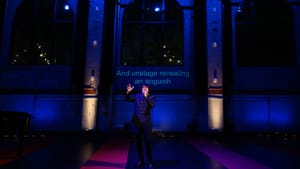When I am laid in earth
Festival O19: Opera Philadelphia and FringeArts present ‘Let Me Die’

What does your mind conjure when you hear the word “opera”? Do you picture Tosca leaping from the Castel Sant’Angelo, or recall Violetta expiring in Alfredo’s arms at the end of La Traviata? Orpheus turning around to gaze on Eurydice and, in one unwitting moment, banishing his beloved back to the underworld? Or maybe your signpost is that most fiery of moments, in the literal and figurative sense: Brünnhilde’s immolation? If so, Joseph Keckler’s Let Me Die, a co-presentation of Opera Philadelphia’s 019 festival and the curated Fringe, might be for you.
Let Me Die, a devised work by Keckler, a musician and performance artist, examines the operatic genre’s preoccupation with kicking the bucket. Suicide, assassination, execution, and that ever-popular soprano-killer—tuberculosis—all get an airing in Keckler’s hybrid lecture/ritual pageant at FringeArts.
Meta-collapse?
Keckler keys in on some of the art form’s most persistent tropes. Have you noticed that women are far more likely to expire by an opera’s conclusion than men? (They account for approximately 75% of opera deaths, apparently.) Or that the surfeit of suffering found in most operas might mirror the genre’s own fabulous-invalid status—with companies always on the brink of collapse, yet pulled back into the corporeal realm by the largesse of wealthy patrons and funding organizations?
Keckler is clearly a thoughtful and engaging performer, though he doesn’t always avoid glibness and overintellectualizing. The program’s first half, presented as a lecture, includes a fair amount of witty but empty statements. (“What if all opera is lost?” he conjectures, in reference to works that only survive in fragments.) His conclusions sometimes betray a keen grasp of the obvious. He quotes Slavoj Žižek, namechecks Marina Abramović, and provides a typed bibliography to the audience—all of which gives the impression that this exercise could have easily been a precocious undergraduate’s term paper.
He also indulges in moments of spectacularly poor taste, as when he suggests that the onstage death of renowned baritone Leonard Warren represents the ultimate performance art.
The life of the show
Yet the work, which was co-created with director and dramaturg Elizabeth Gimbel, contains a number of arresting moments. They largely come when Keckler steps away from his carefully curated narrator persona and sings, revealing a surprisingly sturdy bass-baritone with falsetto capabilities that recall Jeff Buckley’s ethereal tone. His rendering of “The Cold Song” from Purcell’s King Arthur—an aria made famous to a new generation when it was performed, in the early 1980s, by a dying Klaus Nomi—is particularly affecting, and does more than almost anything to further the work’s thesis.
The second half of the program is ceded almost entirely to a trio of singers—soprano Veronica Chapman-Smith, mezzo Natalie Levin, and countertenor Augustine Mercante—who enact various musical groupings that intersect with the overall theme. (They are supported by onstage pianist William Kim and violinist Lavinia Pavlish, both superb.)
Men, witches, and answers
Some of the choices are witty and well-judged, as when a section of the deaths of men is cut noticeably short, and the reassignment of selections outside traditional vocal and gender categories proves inventive and campy. But other elements fall flat: A section on “Witches” seems disconnected from the evening’s mandate, and the inclusion of characters who are not sorceresses (like the Kostelnička from Janáček’s Jenůfa) reinforces the overarching sense of sexism that Keckler otherwise tries to avoid.
Let Me Die ends without answering—or, in some cases, really examining—the questions at its center. But the thoughts it provokes should stay with audience members long after they leave the theater.
What, When, Where
Let Me Die. By Joseph Keckler, with Elizabeth Gimbel. Opera Philadelphia and FringeArts. Through September 28, 2019, at FringeArts, 140 N. Christopher Columbus Blvd., Philadelphia. (215) 732-8400 or operaphila.org.
FringeArts is an ADA-compliant venue. For information on all accessibility features, visit here, call the box office, or email patronservices@fringearts.com. There is a private gender-neutral restroom available on the second floor.
Sign up for our newsletter
All of the week's new articles, all in one place. Sign up for the free weekly BSR newsletters, and don't miss a conversation.

 Cameron Kelsall
Cameron Kelsall